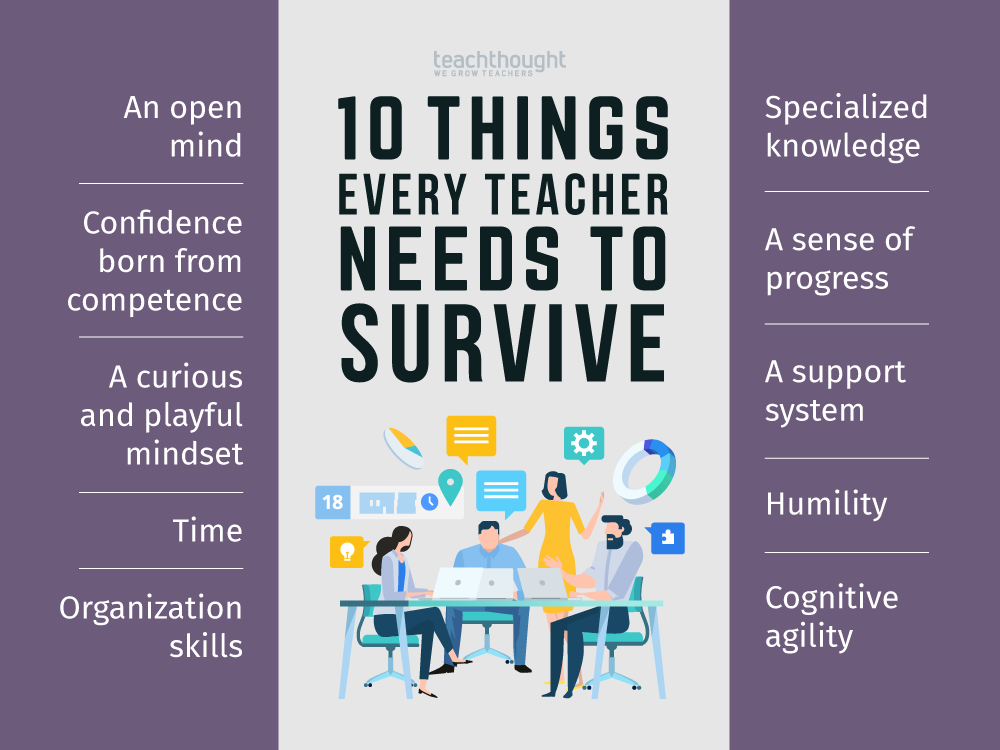
What Does Every Teacher Need In Order To Survive?
by Terry Heick
What a teacher needs depends on the teacher.
Emerging learning trends, data management resources, literacy strategies, digital tools, exemplar curriculum models, increased or decreased autonomy, classroom management tips–this is a list that could get long fast.
But sometimes it can be those less visible characteristics that can determine a teacher’s long-term success. Below I’ve listed 10 ‘things’ every teacher needs to ‘survive’ in the classroom. Some of these are abstract, like mindset, while others are skills like organization and time management. I just tried to brainstorm a variety of factors that can contribute to teachers ‘making it.’
Success in many endeavors in life can be reduced to knowledge, mindset, and opportunity. Knowledge can create ability, awareness, and potential. Mindset can lead to motivation, desire, and creativity. And few things can happen without opportunity.
So to the list below. Some are super obvious and practical; others less so. I just listed each ‘thing’ and a brief justification for each. Ideally, each would benefit from a post of its own, then maybe an eCourse and a book. Maybe one day.
I’d love to hear your thoughts in the comments below.
10 Things Every Teacher Needs To Survive
1. An open mind
Imagine someone with a closed mind surviving in a 21st-century classroom.
2. Confidence born from competence
Confidence is absolutely crucial or the job can eat you alive. But it must be confidence born not from ‘swagger’ but competence in your content area, general pedagogy, and the interpersonal transactions that make it all happen on a daily basis.
3. A curious and playful mindset
This is how great teachers become that way; they have it in year one and–somehow–never lose it.
4. Time
More time is by far the thing I believed I needed most as a teacher and it’s not even close. See here for 8 Ways For Teachers To Save More Time In The Classroom.
5. Organization skills
This goes a long way in giving more time (and I was really bad at it).
6. Specialized knowledge
Whether you’re talking about pedagogy, instructional design, learning models, technology integration, content area expertise, or any other ‘strand’ of teaching, at some point no matter how much time and confidence and organization you have or how curious and playful your mindset remains, you’re going to have to know what you’re doing–how to grow students.
7. A sense of progress
Imagine a teacher thriving in the classroom without one.
8. A support system
There are going to be days when all the knowledge and mindset and coffee in the world can’t help–where nothing you do seems to work. That’s where this comes in. Whether you’re talking about a PLN to assist with a literacy strategy or a best friend who knows you need a hug, support is necessary to survive in the classroom. See here for Why Every Teacher Needs A PLN.
9. Humility
The more humble you are, the more likely you are to absorb the lessons and grow. Humility is central to a growth mindset and isn’t mutually exclusive with confidence. See here for Ideas For Learning Through Humility.
10. Cognitive agility
The ability to solve problems on the fly, assess understanding, imagine a lesson, respond with a kind heart, analyze an opportunity–teaching not only demands a lot but it demands a wide range of a lot. I’m convinced that there are few professions as demanding on the mind, heart, and soul as teaching.
The ability to think laterally, look ahead, demonstrate resourcefulness, etc.–this is the kind of stuff that separates teachers who survive from the ones who do not.
Other Teaching Skills & Personality Traits
What other sorts of skills and personality traits can prove useful in surviving as a teacher? Communication skills, the ability to see the very best in others (which can help you inspire others)–there’s so much that can serve you. Below I’ve added a small handful of other qualities that can serve you well in your craft as an educator.
1. Optimism
You’re never as good as you think you are, and never as bad as you think you are either. Always see the glass half-full because the alternative serves no one.
2. Service Mindset
Teaching is a service profession–carry it in your heart, your thoughts, your words, and your actions.
3. Selective Introversion
Collaboration is forced on the 21st-century teacher from all directions. Sometimes it helps to take a step back and decompress, regroup, and prioritize alone.
4. Agility
When everything changes direction quickly, you need to be able to as well. Data teams, new standards, new technology, new local priorities–the only constant is change.
5. Energy
See 1-7.
6. Humor
When all else fails, laugh.
7. Self-awareness
Knowing your limits and how to take care of yourself, for example. You can’t serve others if you’re not well. This is obvious but easy to forget during the busy school year when peer pressure and ‘local norms’ for teacher behavior can promote unhealthy behaviors that are unsustainable in your teaching.
8. Whatever perspective serves you
This depends on your strengths and ‘weaknesses’ and experience level and local circumstance. I’d call it a ‘growth mindset’ and that’s a big part of it but it’s not just about flexibility and growth and ‘being positive’–it’s about knowing what you need and the people around you need and how to make it all work in a way that’s beautiful and efficient and sustainable for everyone involved.
